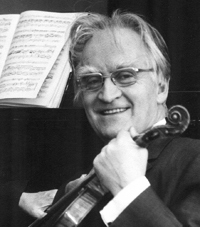|
Björn Ólafsson
Concertmaster |
|||
|
Björn Ólafsson was born in Reykjavík in 1917, at the dawn of the classical
music scene in Iceland. At the age of seven, he was given a toy violin and was so taken by it
that his mother found him a violin teacher; Þórarinn (Thórarinn)
Guðmundsson (b. 1896) who had studied in Copenhagen.
Þórarinn was the first Icelander to study and finish a degree in
violin playing. In 1930 the very first music school in Reykjavík was founded and Björn, at 13, was in the first group to attend it. His teachers there were both from Vienna, Karl Heller and Hans Stephanek. Björn graduated from the Reykjavík Music School in the spring of 1934 and that same fall he moved to Vienna to further his violin studies at the Vienna University of Music. His teachers were Hofrat Mayricker and professor Ernst Moravec. After graduating cum laude in the spring of 1939, he was immediately offered a position in the first violin section of the Vienna Philharmonic, which at that time played under the baton of Wilhelm Furtwängler. Björn returned to Iceland that summer to visit friends and family before taking this position, but the Second World War broke out that fall, preventing him from returning to Vienna. Björn turned all his energy to musical education in Iceland. He became the main violin teacher of the Reykjavík Music School, the head of the string department and the founder of the school orchestra. With pianist Árni Kristjánsson, he gave numerous recitals in Reykjavík and around the country, and frequently their visits led to local music societies being established. In 1931 the Music Society of Reykjavík was founded by a group of citizens of Reykjavík to promote classical music in Iceland. They became the main supporters of the Reykjavík Music School and supported and organized concerts and even supported the Orchestra of Reykjavík, where Björn was the concertmaster. In the fall of 1945 the Music Society of Reykjavík invited violinist Adolf Busch and his son in law Rudolf Serkin to play some concerts in Iceland. That visit was of great importance for Björn because Busch invited him to come and study with him. In 1947−48 Björn stayed in the U.S. studying with Adolf Busch and even had the chance to play in Busch's string quartet. After returning to Iceland Björn, along with his teaching obligations, founded a string quartet whose main purpose was to play weekly live broadcasts on the State Radio. Among the first music they played were all six of Beethoven's opus 18 quartets. This collaboration with the State Radio only lasted for a couple of years, but the quartet existed for the next two decades. The Iceland Symphony Orchestra was founded in 1950 and Björn was the concertmaster, a position he held until 1972. Björn died in Reykjavík in 1984. Björn Ólafsson was one of the pioneers of classical music in Iceland, someone who, with his hard work and ideals, enriched our cultural life, so that the Icelandic nation would become culturally competitive with other European nations. |
||
